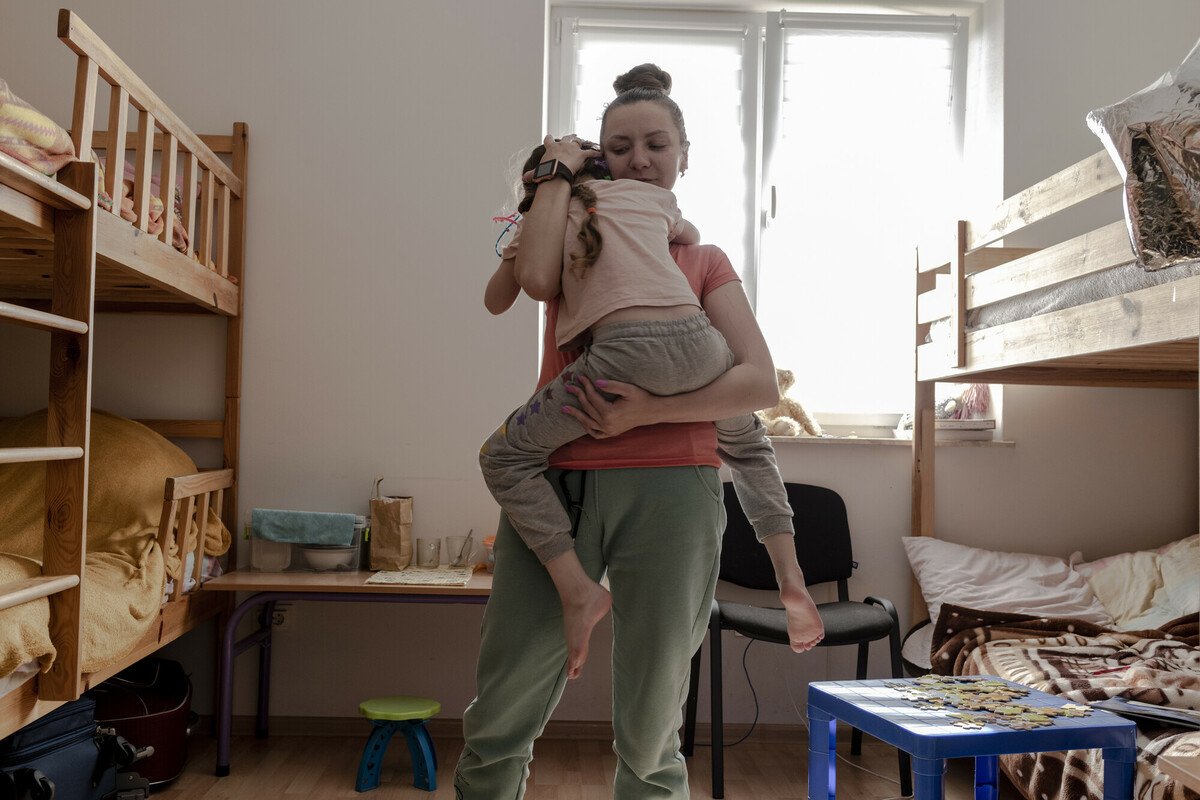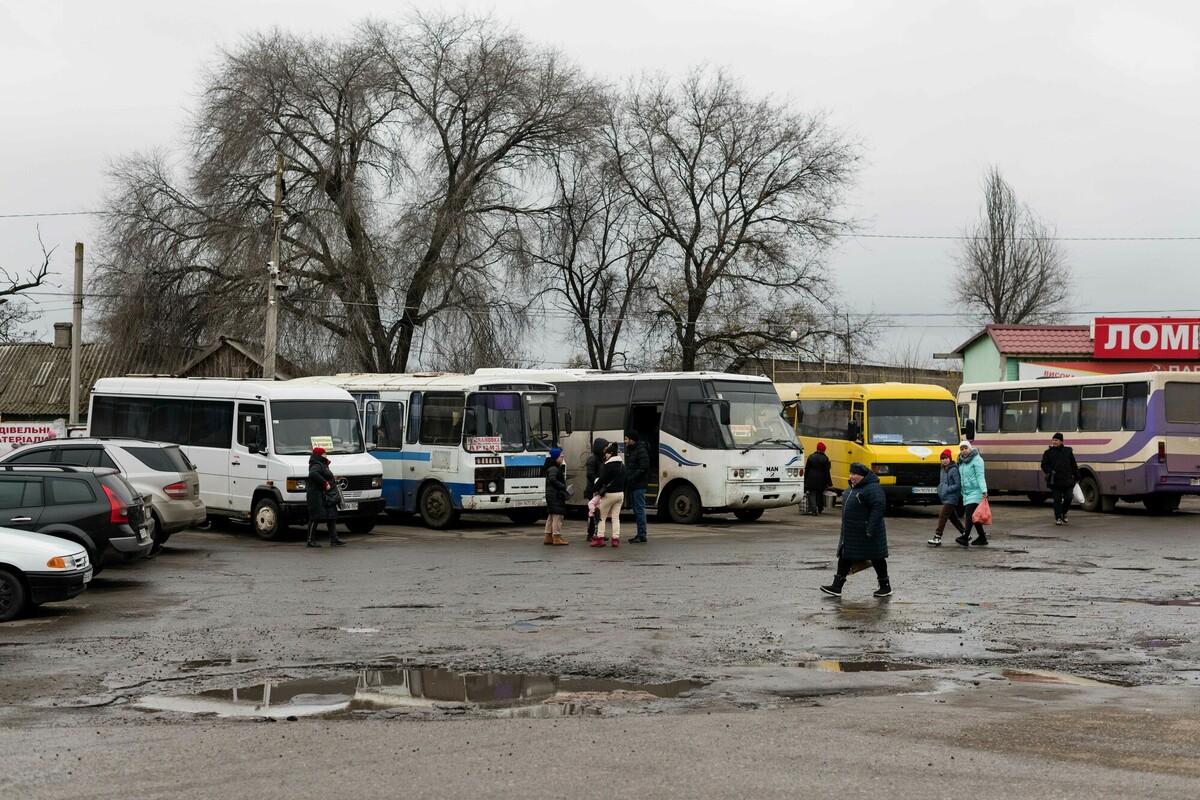“The bombing and missile strikes grew stronger each day. We could no longer sit there and wait for a bomb to hit our house,” said Kristina,* wiping tears from her eyes as she sat on her bed in a sports hall converted into a shelter for displaced people in Lviv in June 2022. “The situation isn’t good there. Our city is surrounded. We came here because of the kids.”
Kristina, a nurse, and her family fled their home in Donetsk region when fighting intensified in March last year. Like millions of others rather than flee the country they had decided to stay in Ukraine as long as they could. Arriving in Lviv by train in March 2022, they were directed to the sports hall, one of more than 200 shelters being supported by HIA, a partner of Christian Aid, with DEC funds.
The conflict has displaced roughly a third of Ukraine’s population as residents fled the missiles, airstrikes and fighting. While it is estimated that as of November 2022 around 7.8 million people have fled Ukraine as refugees, at least 6.5 million have sought sanctuary within the country. All have left behind homes, jobs, businesses, possessions and loved ones and are in need humanitarian support.

Like Kristina, many did not want to leave the country and initially hoped that the conflict would be temporary, so moved with the hope of returning soon. The city of Lviv, in the west of the country, which was left relatively unscathed in the first half of 2022, saw its usual population of around 700,000 double or even triple according to some media reports as people flooded in from the east.
Many fled in a hurry, and often arrived exhausted and emotional after days of travelling. Aid workers in Kharkiv described people from Mariupol arriving penniless, with just a single bag of belongings and no money.
The speed and scale of displacement surprised even the most experienced aid workers. Sarah Hilding der Weduwen, Head of the United Nations Office for the Coordination of Humanitarian Affairs (UNOCHA) Ukraine, says the humanitarian needs of the internally displaced population have been dynamic and grew incredibly fast. “It’s very difficult to keep up,” she says. “We have to be endlessly flexible.”
In Ukraine many of those fleeing were given refuge by local residents. So-called ‘collective centres’ were also quickly set up across the country by local organisations and civil society to provide shared temporary accommodation. These were often in community and government buildings, schools, university dorms or business centres. Others sought refuge in more rudimentary shelters, in basements and subways – places without any hygiene or cooking facilities. All were in need of urgent humanitarian support.

Action Against Hunger’s Deputy Country Director, Willow Rook, says the needs are vast among displaced people living in homes, collective centres or makeshift shelters. “They're choosing to leave for their safety, or they're being forced to leave due to destruction and insecurity,” Rook says. “There are basic needs: shelter, food, water, healthcare. Then there's all of the affiliated challenges that come with leaving home, especially when it comes to assuring basic income and livelihoods.”
DEC charities have used funds from the appeal for cash grants to help set up and support collective centres providing shared accommodation and supporting ad-hoc shelters. Cash grants have also been used to provide food parcels, cooked meals, kitchen utensils and other items. Hot meals were prepared in some contexts while ready-to-eat and tinned and dried food was given out where it was more suitable.
“In terms of food, I can't overstate how big the needs are for some of the most vulnerable populations,” says Rook. “Having hot meals delivered is a lifeline for people who are living in collective centres that don't have fully functional kitchens, or who have a kitchen that's shared amongst dozens of people.
“Some of our food partners are reaching elderly people, vulnerable families that are living in basements, living in substandard shelters. Places that they've had to move to due to active hostilities, where they perceive safety, and otherwise don't have access to consistent fuel sources [and] kitchens. These services are vital.”

Action Against Hunger is working with businesspeople who converted company canteens to produce and distribute food to people who couldn’t access other kitchens or restaurants. In Dnipro, the agency is supporting a former restauranteur who is giving displaced people free meals in a warm setting. There are also takeaway setups where people prepare and distribute hundreds of meals a day to people that are displaced and in need.
DEC charities have also supplied collective centres with cleaning and disinfecting supplies, installed washing machines and dryers and handed out hygiene kits containing essentials such as shampoo, soap and sanitary products.
DEC funding has allowed local organisations to scale up or extend the duration of their programmes. “We only had enough funding for two months and could see that the [number of internally displaced persons (IDPs)] was really high in our region,” says Mariya Tuzyk, Project Coordinator for Posmishka UA, a charity working with Concern Worldwide in the west of Ukraine. “What the DEC funding meant was that we could prolong the programme. Without it, we wouldn't have been able to continue. So it’s really helped us to reach a much bigger section of the IDPs and provide more assistance to more families.”

Multi-purpose cash assistance – giving money directly to people in need – proved to be a quick way of supporting displaced people to buy what they needed immediately, such as food, soap, toothpaste, nappies and medical items like insulin. As well as helping to give people some choice in how best to meet their needs, it reduced the cost of delivering aid and helped to foster good relationships with host communities by supporting local markets, producers and employment.
In the first six months of the response, 177,000 people inside Ukraine received cash payments using DEC funds, accounting for 37% of our expenditure in the country – the highest of any sector.
Priority was given to vulnerable people including older people, people with disabilities or chronic diseases, single-parent families and households where a family member had been killed or injured. Recipients could choose how to receive the grants, including by digital transfer or by post. For more on how DEC charities supported vulnerable people see Vulnerable Groups.
Charlie Acland, Programme Director of Concern Worldwide’s surge team in Ukraine says cash assistance, which the charity began distributing in September 2022, “made the most sense” in places where markets were working and accessible. Concern gave selected displaced people in Melvinsky in the west and Poltava in central Ukraine £60 a month per person for three months via digital bank transfer to help them “get by.”
“People have lost jobs, or moved to areas where they can no longer do their old jobs. Prices went up,” he says. “But at the same time, there is everything you could possibly need available in shops. The roads remain passable, fuel is available. It's safe enough to get around the markets. Basically, they're functioning and accessible. People repeatedly said to us, we just need to be able to buy the basic things we need.”
Cash grants were used to support newly established organisations helping displaced people. HelpAge International, partner of DEC charity Age International, decided on a cash grant system after visiting lots of centres housing people, and finding they all had very different needs. DEC funding supported HelpAge to provide cash grants of up to £20,000 to 39 of these organisations, with clear controls of accountability.
Keeping cash grants like these flexible has been key as needs can change quickly in the midst of a conflict. In Vinnytsia in west-central Ukraine, such funds through DEC charity World Vision meant a collective centre could quickly repair its windows and doors after they were blown out in a nearby missile strike. In another case, a grant intended to equip a bomb shelter at a high school in Kharkiv was instead used to repair vehicles to evacuate people from areas affected by the conflict after the school was destroyed in a rocket attack.
Appeal funds have also helped the large numbers fleeing to meet other needs: light, portable hygiene kits were handed out to many of those travelling in search of shelter. As people fled Odesa to seek safety, they were given packed lunches for the train.

People arriving at collective centres, often after days of travelling, were exhausted and incredulous. Charlie Acland from Concern Worldwide remembers meeting a man and his young daughter after they had travelled about 48 hours from Kharkiv to reach Khmelnytskyi. He describes them as being in a state of both grief and shock. “As with others I've spoken to, in those early stages, I think people were struggling to believe this had happened to them,” he says.
Viktoriya Gora from Caritas Odesa, a partner of Oxfam, who was previously a social worker, says displaced people arrived “very lost” but that talking often helped them process their experiences. “People sometimes just need to talk,” she says. “Sometimes when you ask them what their address is [to register for cash payments], they start to cry because they know that their house doesn't exist anymore. They just need to share it with somebody who can listen.”
Caritas Odesa worked with social workers to support internally displaced people, referring those needing further support to other services. Once given that support and help, many would want to give back. “There are many people who would come, they got food baskets the second day after they arrived and the third day they will come and say ‘OK, where can I volunteer? I want to help as well.’ So people are not just sitting at home and waiting, they're trying to do something to make change, to make an impact.”
DEC charities have also helped local authorities cope with the rising demand that growing numbers of displaced people have placed on services. For example, when one local authority in the Odesa region found its water system struggling to meet the increased demand caused by the influx of displaced people from the east, they put a call out to NGOs for help. DEC charity Oxfam was able to use DEC funds to upgrade the water supply system, providing clean water for 73,000 people and a local hospital.
Unlike many crises, the displacement in Ukraine has been fluid, with many people moving around within the country, and others leaving Ukraine and returning. For example, a pregnant woman who was being supported by a DEC charity after being displaced to Lviv left Ukraine to give birth and then returned to Ukraine once her baby had been born. A displaced man who couldn't find work in Lviv decided to return to Kharkiv. Even refugees in neighbouring countries sometimes return to Ukraine to visit family members or check on property.

The circumstances of those being displaced has changed over time as well. People who left their homes in the early phases of the conflict – but who had not been bombed out – tended to be in a more stable financial position, according to Viktoriya Gora at Caritas Odesa. Those leaving now as winter kicks in are more likely to be more desperate: choosing not to leave previously because they lacked the means to support themselves in a new place.
“If they're leaving now, it means it was just impossible to survive where they were anymore,” she says. “And they're usually coming to Odesa with literally nothing, just their documents in a pocket.”
Sadly, winter and shifting frontlines are causing some people to be displaced for a second or third time since the conflict escalated in February. The Ukrainian government has also been encouraging people to leave some areas in the east during winter due to a lack of power and heating, or due to the changing conflict. For example, the city of Kherson, which was occupied by Russian forces early in the conflict and has since been retaken by Ukraine has faced increased shelling and mortar fire, with the authorities urging residents to leave for safer areas.
As the conflict grinds on, people will continue to be displaced. Each transition upends lives, livelihoods, shatters support networks, impacts mental health and creates acute humanitarian need. Thanks to generous donations from the UK public, DEC charities will continue to use appeal funds to help families and children whose lives the fighting has thrown into such flux.
*Names have been changed to protect identities.